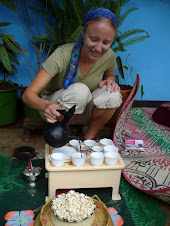In the still hours of the morning of Wednesday, November 5, in Bahirdar, Ethiopia, an international assembly gathered on the patio of the Obama Café. Throughout a sleepless night, they kept vigil over the American election, watching a gargantuan outdoor screen that seemed to reflect not only the proceedings themselves but also their momentous implications. Day broke, and as the rising light gradually overwhelmed the projected images, they moved indoors and crowded around the small television, where just an hour later, together with a fresh contingent of locals, they would celebrate the anticipated election of Barack Obama as the next president of the United States of America.
It was like the long-anticipated finale of an epic narrative we had been observing in installments from afar. We had heard the equally compelling yet vastly different personal stories of the two candidates. We had watched the long and grueling fights through the primaries. We had followed all the twists and turns of the general election campaign, the promises, posturing, predictions, foibles, attacks, criticisms, doubts, and wildest wishes. We wondered as, incredibly, all around the world, everywhere we turned, a wave of excitement for a young, black Illinois Senator swept powerfully through hearts and hopes. Finally, together, we watched him make history.
It was the storybook ending breathlessly desired by the Ethiopian people. Inside the Obama Café, there were cheers and tears, embraces, applause, and a rush of phone calls to family and friends. Meanwhile, footage of Obama-supporting crowds broadcast from all across the world mirrored the outpouring of emotions. There were the images of a victorious Obama at dramatic camera angles, the stirring music, the expectant silence that fell over the gathering as he delivered his acceptance speech, passionate words recalling the momentous march of progress over American history. One could hardly help being swept up in the poignancy of the moment.
For the Ethiopians with whom I watched this all unfold, the pivotal storyline was all about the ground-breaking rise of a son of Africa to the American presidency. Coincident to this historic moment, however, a highly significant side plot was playing itself out. For me, the climax of all the drama came not with Obama's acceptance speech, but with John McCain's concession. There, the American democratic ideal was reflected not only in the ascent of a multi-racially and internationally rooted young man with a foreign name to the seat of highest national executive power, but also in the humble, selfless bending of his opponent to the will of the people.
On stage before his supporters and before the eyes of the world, Senator McCain acknowledged, "The voice of the people overwhelmingly has spoken…" Then, he affirmed Barack Obama as the nation's president, as his president, and promised to continue to service his country faithfully under Obama's leadership. On a continent where power is the ultimate prize and its passing often proves the ultimate problem – a continent shaken by Robert Mugabe's brutal attempts to cling to power in Zimbabwe, horrible election violence in Kenya, military coups, warring factions and constitutional manipulations that have become all too painfully common – it was a moment and a message I was proud to share from my country.
When I consider my country's image on the global stage and think about how I would like the world to see us in this recent election, I do hope that people see the progress and promise of America in a victory that would have been unthinkable not so long ago. I hope we can join together to celebrate a triumph for racial equality and the embracing of a dynamic, multicultural society. But I also hope, especially living here in eastern Africa, that the image of a people determining their future, of one man stepping aside to yield to their collective voice while another steps up to heed their call, will be one that endures. This is government "of the people, by the people, and for the people." This is the dream of America.
skip to main |
skip to sidebar

Modern Tales of a Southern Girl in an Ancient Land

My Ethiopia Photos
- My Welliso Pics
- More Welliso Pics
- Other Welliso Pics
- Last Night in Welisso
- Peace Corps Swear-In
- Life in Debremarkos Pt. 1
- Life in Debremarkos Pt. 2
- Little Travels Around Ethiopia
- Sodere and In-service training
- Simien Mountains
- Gonder
- World Cup Qualifier
- More from Markos
- Welliso Wedding
- Bahirdar Fun
- Here and There
- Excursion into the Hills
- Lalibela
- Round and About
- Timkat In Gonder
- Life Continues in Markos
- Fasika in Assela
- Shashemane, Wolaita, Arba Minch
- Mertolemariam
- Bale Mountains
- Random Others
- Up North
- Out West
Blog Archive
About Me
I'm here in Ethiopia for the next couple of years. I'm experiencing new things, encountering new ideas, and generally trying to sort out myself and the world around me. I'm meeting new people, discovering their stories, and opening myself up to be profoundly impacted by them. Hopefully along the way I'll do some good.
Disclaimer
The views expressed on this site are mine alone and do not necessarily represent the opinions of the Peace Corps or the governments of Ethiopia or the United States.
My Address
Christen Marie
P.O. Box 141
Debremarkos
Ethiopia
P.O. Box 141
Debremarkos
Ethiopia
No comments:
Post a Comment